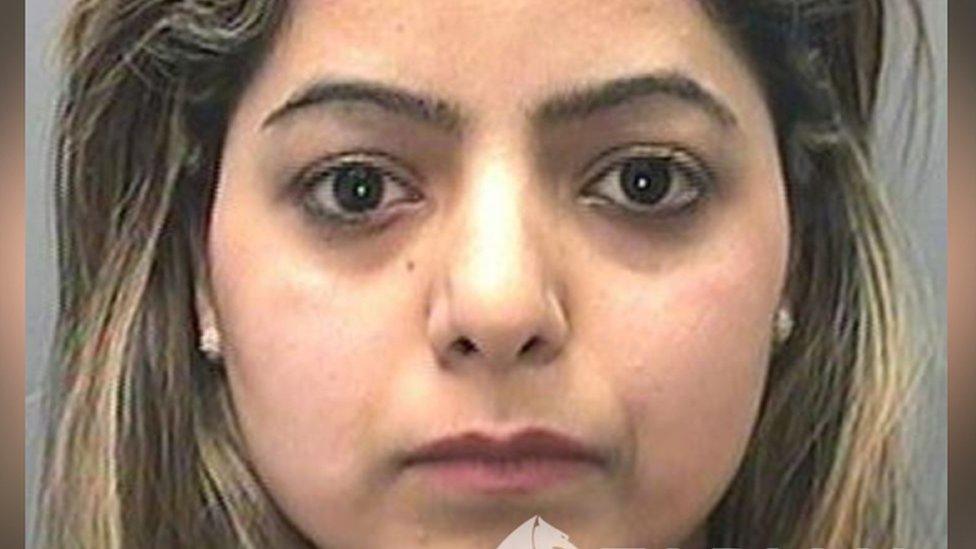Driving test fraudsters advertising services online
- Published
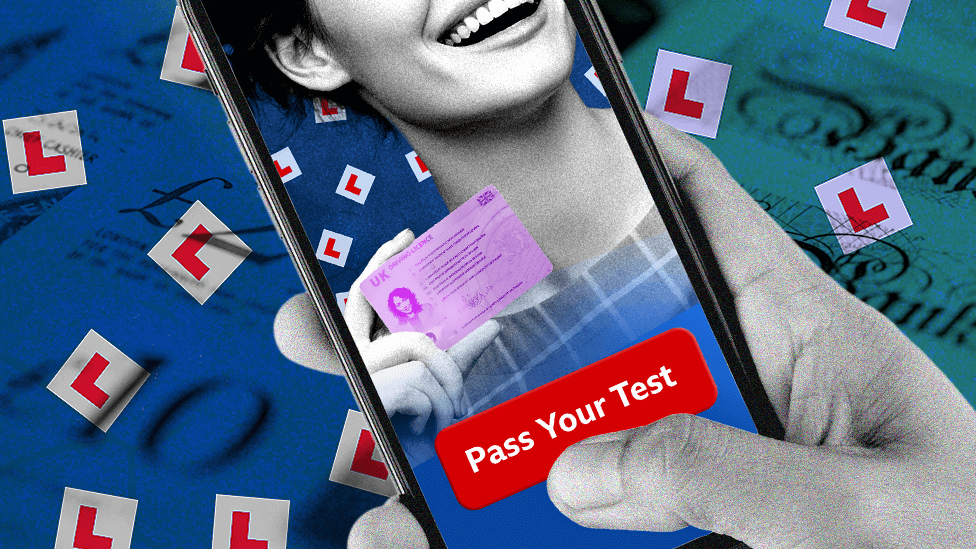
Fraudsters who offer to help people illegally pass their UK driving tests are advertising their services widely across social media, the BBC has found.
More than 600 pages, groups and accounts exist on Facebook and TikTok promising licences without taking tests - with thousands of followers.
Some suggest lookalikes to take the practical test - others offer theory test help via a Bluetooth earpiece.
Meta and TikTok said such content violates their guidelines.
BBC Verify analysed data from Facebook and TikTok and found as of 16 June there were at least 669 pages, groups and accounts with 138,900 followers which advertised driving licence services without taking a test. Adverts also appear on Instagram.
Reports of driving test fraud through impersonations have more than trebled in the past five years - from 654 in 2018 to 2,015 in 2023 - exclusive figures given to the BBC by the Driver and Vehicle Standards Agency (DVSA) reveal.
It says the number of people who are being caught - and having their licences revoked - is increasing, although it remains a largely hidden problem.
Between April 2021 to March 2022, more than four million theory and practical car tests were taken in the UK, with a pass rate of about half.
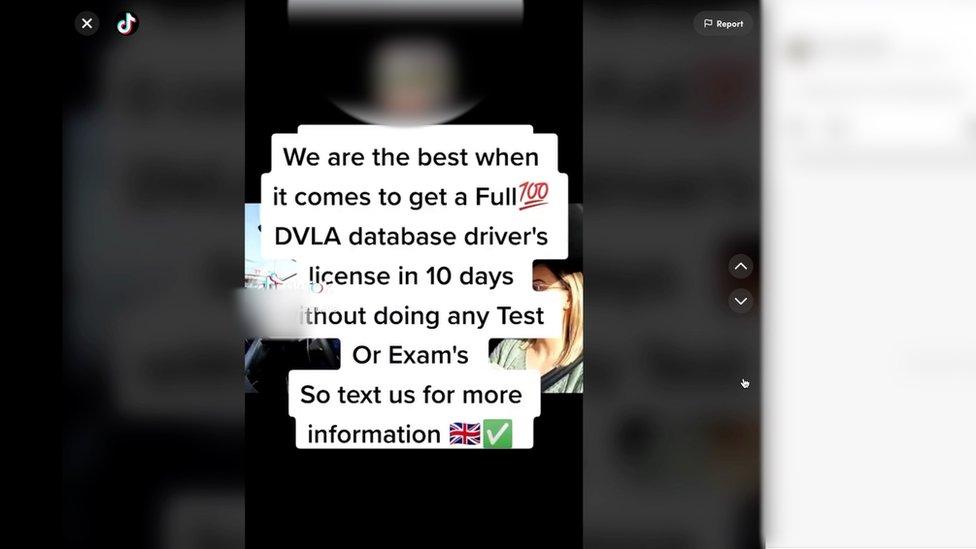
Still from a TikTok story advertising a full UK driving licence without taking a test
Our investigation found social media platforms littered with posts in different languages. Many use genuine pictures of pass certificates and driving licences which have been taken from promotional images posted on real driving school social media accounts.
The posts provide limited information about how these licences are provided without taking a test, most posts just provide a mobile number or ask people to contact them for more information via a direct message.
The BBC contacted several people advertising these services on social media, posing as someone without any driving experience who was looking for a licence.
Find a lookalike
One man advertising on Facebook claimed he could provide a UK driving licence for £720, with the pass certificate delivered to the reporter's home in five days - without anyone actually sitting a test.
A theory test costs £23 and the practical test £62, but the RAC estimates the total cost of learning to drive is £1,551 including tests and lessons - assuming the person passes first time. In Northern Ireland the tests cost £23 for the theory and £45.50 for the practical test.
One woman who advertised on Facebook in Vietnamese told our reporter she charged £1,600 for help with cheating the theory test and £2,600 for the practical driving test - a total of £4,200.
She said first she needed to see what the reporter looked like to ensure she had a suitable lookalike to take the tests.
The BBC also tracked down a woman who paid for a fraudulent service. She had found someone via a Facebook post to take the practical test for her son who had been struggling to pass.
The mother paid the fraudster about £1,000 after he had passed the test on her son's behalf.
If the woman's son is ever caught he would have his licence revoked and face prosecution for fraud, potentially resulting in a prison sentence and/or a fine.
TikTok and Meta, the company that owns Facebook and Instagram, told the BBC that the solicitation of driving licence fraud is not allowed on their platforms and any content found that violates their guidelines will be removed.
TikTok also says it has taken action against a number of accounts following the BBC Investigation.
'Desperation for tests'
Driving instructors have told the BBC that the rise in practical test fraud could be due to the length of time it is taking to get a practical test slot.
In some parts of the UK there are waiting times of up to six months due to a backlog following the Covid pandemic. Some of the fraudsters the BBC spoke to were willing to travel to parts of the UK where waiting times are shorter to take the test for others.
Carly Brookfield, chief executive of the Driving Instructors Association, said the backlog was causing "a desperation for test slots".
"If you're facing the fact that if you don't pass the test you have to wait for up to six months [to try again], then you're going to think about cheating the system," she said.
She added that some of the instructors in her association had been approached by people running criminal services, asking them to refer pupils struggling to pass their test.
The high demand for tests has led to operators bulk-buying slots using automated software and reselling them at an inflated price.
The DVSA says it is actively removing accounts which do this as it breaks the terms and conditions of the booking platform.
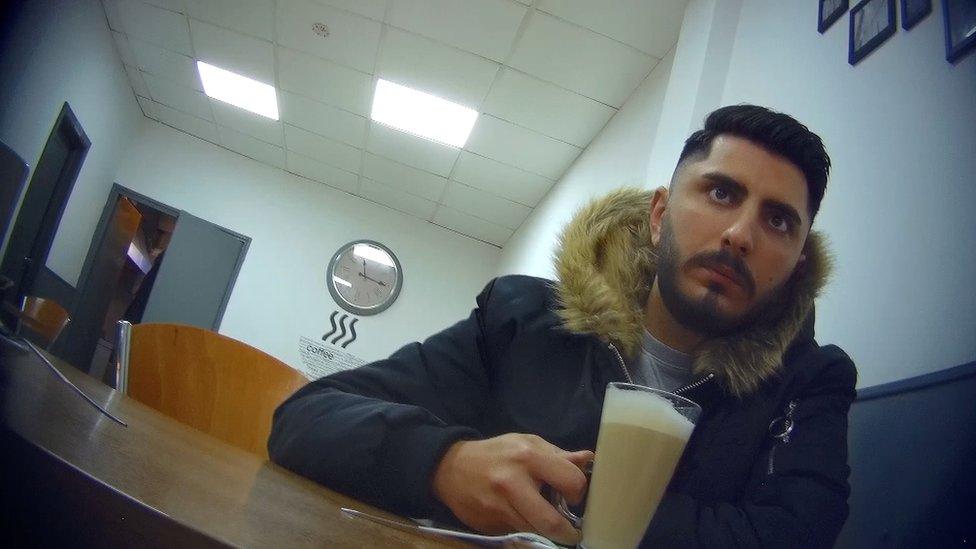
The man, who called himself Erdal, told the reporter he could feed them the answers to the theory test via a Bluetooth earpiece
During the investigation, the BBC found a flyer in a London cafe written in Turkish offering a "100% guarantee" method to pass the theory test.
Our undercover reporter, posing as someone with little experience of driving, met the man behind the advert, who called himself Erdal.
He told the reporter he could help them cheat by feeding them the answers to the test's multiple choice questions using a "microscopic" Bluetooth earpiece, connected to a mobile phone.
He told them by clicking on the questions they would be "read out loud" by the computer which would allow him to whisper the correct answers.
He said: "It's £1,500 and you will pay me right after taking the test. You will be wearing a device in your ear. The test administrators will not look in your ear.
"We have done this for a long time. We do this for a minimum of two people every day."
After the meeting, the BBC called the number we had for the man to confront him about the scam. The person that answered had the same name but denied knowing anything about test fraud.
These scam online adverts can also cause identity fraud problems for the people who have photos of their test pass certificates or driving licence lifted from legitimate sites.
We spoke to Ian Jones, who had a photo of his driving licence stolen from a logistics company he was registered with. He later discovered it was being used on Instagram by someone advertising a service for "theory/practical certificate without exams".
Mr Jones says in the past year he has had to dispute hundreds of French speeding and parking tickets he has received because his licence details are being used fraudulently abroad.
He said: "It makes you paranoid, it gives you a horrible feeling, it's like being burgled - you feel violated."
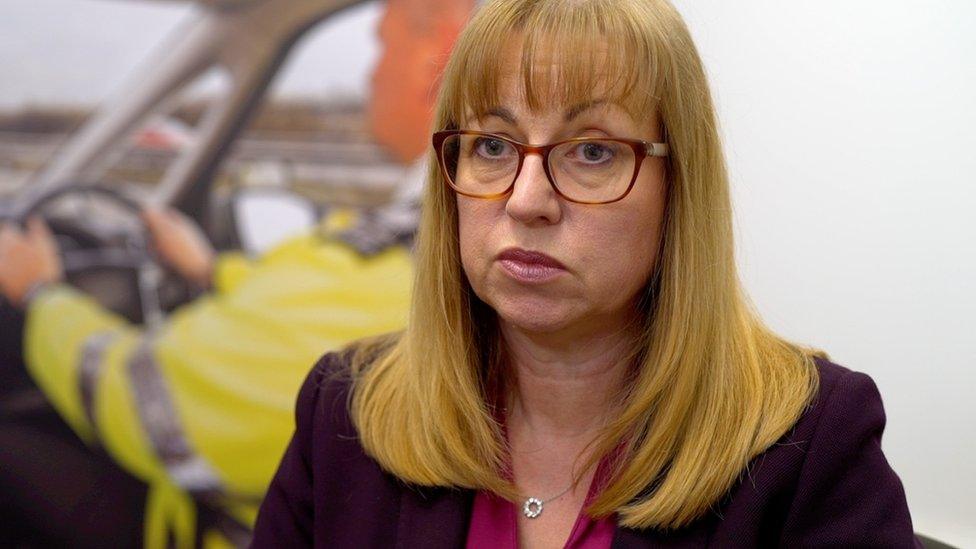
The DVSA's head of law enforcement said it had revoked hundreds of illegally-obtained licenses in 2022
The Driving Standards Agency, (DVSA), which promotes road safety and sets standards for training, warns many online adverts promising full licences quickly are money-making scams which may only provide a fake licence. It adds only the Driving and Vehicle and Licensing Agency (DVLA) can issue a genuine driving licence.
The number of people being prosecuted for test fraud via impersonations are increasing, the DVSA says. If convicted, they face prison sentences and fines. Last year, a woman was jailed for eight months for taking approximately 150 theory and practical tests for other drivers.
The DVSA warns if people do not meet the necessary driving standards before taking control of a vehicle, it could cause serious injuries or even fatalities.
Its head of law enforcement, Marian Kitson, said its investigation team was catching more people committing fraud and had revoked hundreds of illegally-obtained licences in 2022.
In the year from April 2022, it sent 30 cases - involving 497 offences - of fraud by false representation for prosecution and there were 53 arrests.
However, Ms Kitson said it was clear from their investigations that there was even more occurring, adding that they did not know the true scale of the problem.
"The internet is so huge; the social media platforms are vast and these people are very clever, they move the adverts around; they change them frequently," she said.
"So actually, spotting them and taking action quickly is a real challenge."

Have you been affected by the issues in this story? You can share your experiences by emailing haveyoursay@bbc.co.uk, external.
Please include a contact number if you are willing to speak to a BBC journalist. You can also get in touch in the following ways:
WhatsApp: +44 7756 165803
Tweet: @BBC_HaveYourSay, external
Please read our terms & conditions and privacy policy
If you are reading this page and can't see the form you will need to visit the mobile version of the BBC website to submit your question or comment or you can email us at HaveYourSay@bbc.co.uk, external. Please include your name, age and location with any submission.

Sign up for our morning newsletter and get BBC News in your inbox.

Related topics
- Published1 June 2022
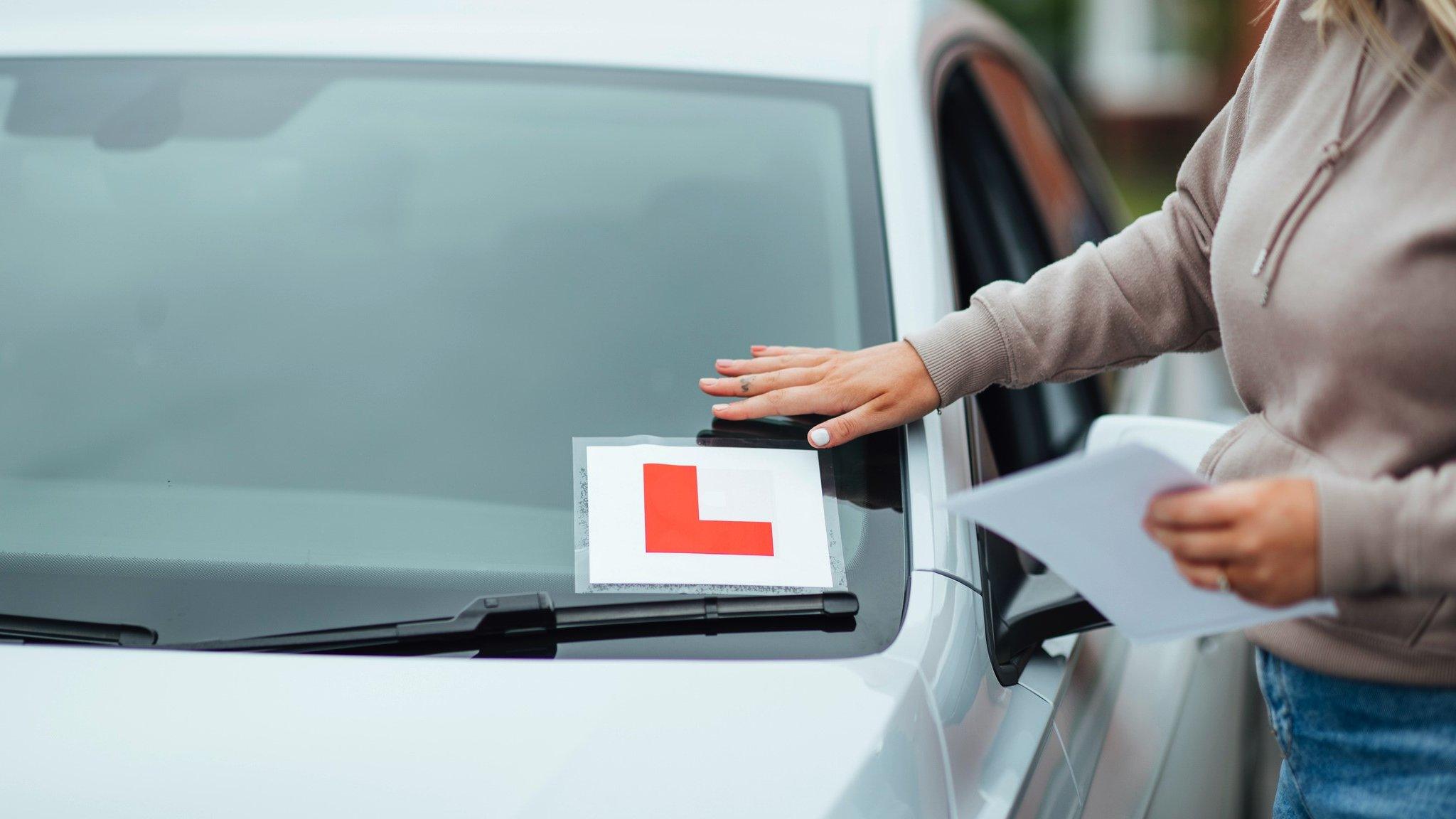
- Published30 March 2023
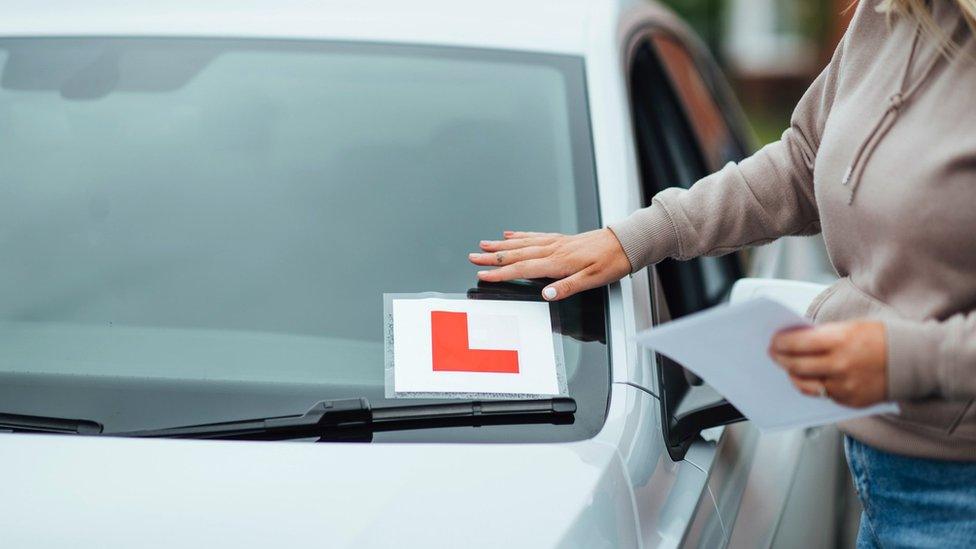
- Published7 July 2022
